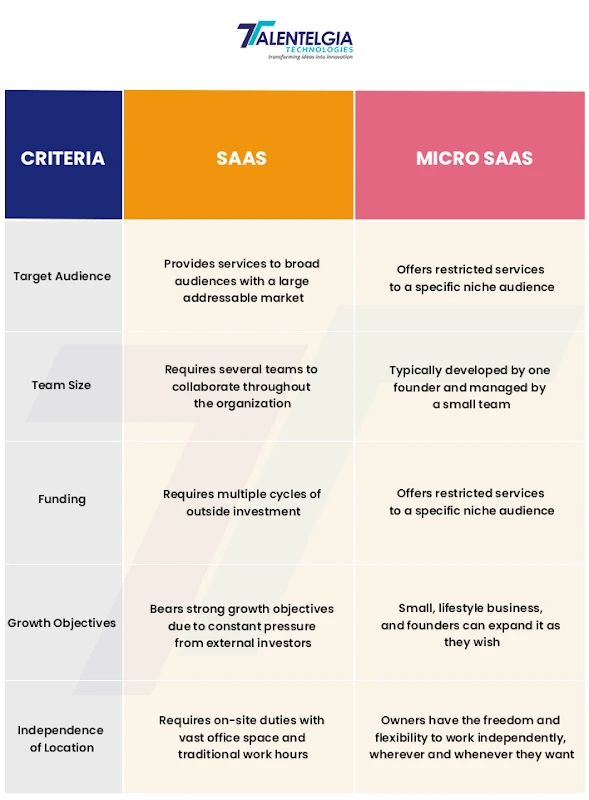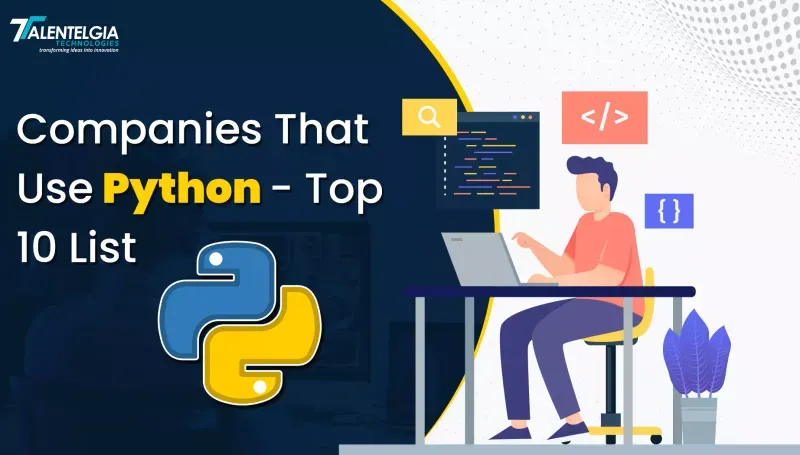Micro SaaS is a term that refers to software as service businesses that target a niche market, run by a small team or a solo founder, with low costs and high margins. Micro SaaS businesses are usually location-independent, scalable, and profitable without external funding. They aim to solve specific problems better than their larger competitors by focusing on a narrow segment of customers.
In this blog, we will address several areas related to micro SaaS, which include defining what micro SaaS is. Also analyzing both the pros and cons associated with utilizing micro SaaS solutions and exploring actual cases of micro SaaS success.
We will also look at some of the top micro SaaS ideas and trends for 2023 and how to choose suitable solutions for your business needs.
What is Micro SaaS?
It makes software that solves a particular issue or serves a certain group of people. Unlike traditional SaaS businesses that aim to serve a large and diverse market with multiple features and functionalities, micro SaaS businesses target a smaller and more defined segment of customers with a single or few features that solve their pain points.
Some of the characteristics of micro SaaS businesses are:
- They have low operational costs and high profit margins, often generating revenue from subscriptions or one-time payments.
- They do not require external funding or investors, relying on bootstrapping or organic growth.
- They have a narrow focus and a small but dedicated user base, often serving a niche within a niche.
- They leverage existing platforms or tools to build and distribute their products, such as Shopify, WordPress, Zapier, etc.
Some examples of micro SaaS businesses are:
- Storemapper: A store locator widget that can be embedded into any website without coding.
- SuperLemon: A WhatsApp plugin for Shopify stores that enables live chat, abandoned cart recovery, order notifications, and more.
- UserGuiding: A user onboarding tool that helps create interactive product tours and guides without coding.
- Mailbrew: A personalized email digest service that curates content from various sources such as Twitter, Reddit, RSS feeds, newsletters, etc.
- Plausible: A privacy-friendly web analytics tool that does not use cookies or track personal data.
SaaS Vs Micro SaaS: Difference
SaaS (Software as a Service) and Micro SaaS are two models of delivering software applications over the internet. While both are cloud-based, there are significant differences between the two.
Here is a table that outlines some of the primary differences:

Different Types of Micro SaaS
Micro SaaS businesses can be classified into different types based on their target market, product offering, distribution channel, and revenue model. Here are some of the common types of micro SaaS businesses:
- Platform-specific: They leverage the existing user base and functionality of these platforms to offer complementary or alternative solutions. For example, SuperLemon is a platform-specific micro SaaS business that builds products for Shopify stores.
- Feature-specific: These are micro SaaS businesses that focus on providing one or few features that solve a specific problem or need. They do not aim to compete with larger or more comprehensive solutions but rather to fill a gap or offer a better alternative. For example, UserGuiding is a feature-specific micro SaaS business that provides user onboarding solutions.
- Audience-specific: These are micro SaaS businesses that cater to a specific segment of customers based on their industry, profession, interest, location, etc.
- Revenue-specific: These are micro SaaS businesses that have different revenue models than the typical subscription-based or freemium-based models.
Benefits of Using Micro SaaS
Micro SaaS solutions offer various benefits for both customers and creators. Some of these benefits are:
– For customers:
- Lower cost: Micro SaaS solutions are usually cheaper than larger or more complex solutions because they have lower operational costs and overheads
- Better support: Micro SaaS solutions offer better customer service and support than larger or more impersonal solutions because they have a direct connection with their users and can respond to their feedback and requests faster and more effectively
– For creators:
- Faster development: Micro SaaS solutions can be built and launched faster than larger or more complex solutions because they have fewer features and functionalities to develop and test
- Lower risk: Micro SaaS solutions have lower financial and operational risks than larger or more complex solutions because they have lower costs, higher margins, and no dependency on external funding or investors
- Greater freedom: Micro SaaS solutions offer greater freedom and flexibility for their creators than larger or more complex solutions because they can work from anywhere, choose their own tools and technologies, and make their own decisions without bureaucracy or interference
Challenges of Implementing Micro SaaS
Although Micro SaaS can be useful, there are also some difficulties that come with it. Some of these problems are:
- Picking a profitable niche: Micro SaaS needs to identify a specific group of people that has a particular issue that is not being fully resolved by current solutions. They must also find a group that is willing to buy a better answer to their problem. To do that, they have to do a lot of study and research to find possible niches and consumers and experiment with them.
- Being different from competitors: They must be creative in how they stand out from others who are providing similar solutions. They must have innovative ideas and be good at promoting and demonstrating to their preferred group of people what they can offer uniquely.
- Growing business: Micro SaaS face the challenge of balancing between increasing their business and making a profit. As they expand their user base and earnings, they need to handle the costs, resources, and quality of their service. They should do strategic planning, optimization and automation to scale up effectively and efficiently.
Examples of Real-Time Micro SaaS Implementations
There are many examples of successful micro SaaS implementations across various industries and domains. Here are some of them:
- Loom: A video messaging platform that allows users to record and share videos of their screen, camera, or both. Loom is used by individuals and teams for communication, collaboration, education, feedback, and more.
- Calendly: A scheduling tool that allows users to book meetings with others without back-and-forth emails. Calendly integrates with various calendars, platforms, and tools to streamline the scheduling process.
- Notion: A productivity tool that allows users to create notes, documents, databases, wikis, projects, and more in one place. Notion is used by individuals and teams for personal and professional purposes.
- Zapier: A workflow automation tool that allows users to connect various apps and services without coding. Zapier enables users to create workflows or zaps that trigger actions based on events or conditions.
Top Micro-SaaS Ideas and Trends for 2023
Micro SaaS is a growing trend in the software industry that is expected to continue in 2023. Some of the top micro SaaS ideas and trends for 2023 are:
- AI-driven micro-SaaS: With advancements in artificial intelligence, micro-SaaS solutions that leverage AI could be on the rise. These could include chatbots, AI-powered analytics tools, and more.
- Niche market solutions: There may be a growing demand for micro-SaaS solutions that cater to niche markets and industries, such as healthcare, education, and agriculture.
- Mobile-first solutions: As mobile usage continues to grow, micro-SaaS solutions that are designed for mobile devices first could become more popular.
- API-first solutions: Micro-SaaS solutions that are built with an API-first approach could be a trend in 2023, making it easier for them to integrate with other tools and systems.
- Localized solutions: Micro-SaaS solutions that are developed for specific regions or countries could gain momentum in the coming years, as they cater to specific needs of those markets.
- Sustainability-focused solutions: As the world becomes more environmentally conscious, micro-SaaS solutions that promote sustainability or reduce environmental impact could become more popular.
How to Choose Suitable Micro SaaS Solutions Company
Choosing suitable micro SaaS solutions for your business needs can be challenging.
Here are some tips to find the right micro SaaS solutions for your business:
- Consider scalability: Make sure that the selected micro SaaS solution can be easily scaled up or down as your business needs change.
- Look for integrations: Check if the micro SaaS solution can integrate with other tools and systems that you use in your business.
- Check for security and compliance: Verify that the selected micro SaaS solution meets necessary security and compliance standards required for your industry.
- Assess the vendor’s reputation: Check the vendor’s experience, customer support, and customer satisfaction ratings before finalizing your selection.
 Conclusion
Conclusion
Micro SaaS is a growing trend in the software industry that offers various benefits and challenges for both customers and creators. Micro SaaS solutions are software solutions that target a niche market, run by a small team or a solo founder, with low costs and high margins. Micro SaaS solutions can be classified into different types based on their target market, product offering, distribution channel, and revenue model.
Some of the challenges of implementing micro SaaS solutions are finding a profitable niche, standing out from the competition, and scaling the business. Some examples of real-time micro SaaS implementations are Loom, Calendly, Notion, Zapier, and Webflow. Some of the top micro SaaS ideas and trends for 2023 are remote work, e-commerce, education, and health and wellness tools. To choose a suitable micro SaaS solutions company for your business needs, you must define your problem or need, research your options, compare and evaluate them, and test and implement them.


 Healthcare App Development Services
Healthcare App Development Services
 Real Estate Web Development Services
Real Estate Web Development Services
 E-Commerce App Development Services
E-Commerce App Development Services E-Commerce Web Development Services
E-Commerce Web Development Services Blockchain E-commerce Development Company
Blockchain E-commerce Development Company
 Fintech App Development Services
Fintech App Development Services Fintech Web Development
Fintech Web Development Blockchain Fintech Development Company
Blockchain Fintech Development Company
 E-Learning App Development Services
E-Learning App Development Services
 Restaurant App Development Company
Restaurant App Development Company
 Mobile Game Development Company
Mobile Game Development Company
 Travel App Development Company
Travel App Development Company
 Automotive Web Design
Automotive Web Design
 AI Traffic Management System
AI Traffic Management System
 AI Inventory Management Software
AI Inventory Management Software
 AI Software Development
AI Software Development  AI Development Company
AI Development Company  AI App Development Services
AI App Development Services  ChatGPT integration services
ChatGPT integration services  AI Integration Services
AI Integration Services  Generative AI Development Services
Generative AI Development Services  Natural Language Processing Company
Natural Language Processing Company Machine Learning Development
Machine Learning Development  Machine learning consulting services
Machine learning consulting services  Blockchain Development
Blockchain Development  Blockchain Software Development
Blockchain Software Development  Smart Contract Development Company
Smart Contract Development Company  NFT Marketplace Development Services
NFT Marketplace Development Services  Asset Tokenization Company
Asset Tokenization Company DeFi Wallet Development Company
DeFi Wallet Development Company Mobile App Development
Mobile App Development  IOS App Development
IOS App Development  Android App Development
Android App Development  Cross-Platform App Development
Cross-Platform App Development  Augmented Reality (AR) App Development
Augmented Reality (AR) App Development  Virtual Reality (VR) App Development
Virtual Reality (VR) App Development  Web App Development
Web App Development  SaaS App Development
SaaS App Development Flutter
Flutter  React Native
React Native  Swift (IOS)
Swift (IOS)  Kotlin (Android)
Kotlin (Android)  Mean Stack Development
Mean Stack Development  AngularJS Development
AngularJS Development  MongoDB Development
MongoDB Development  Nodejs Development
Nodejs Development  Database Development
Database Development Ruby on Rails Development
Ruby on Rails Development Expressjs Development
Expressjs Development  Full Stack Development
Full Stack Development  Web Development Services
Web Development Services  Laravel Development
Laravel Development  LAMP Development
LAMP Development  Custom PHP Development
Custom PHP Development  .Net Development
.Net Development  User Experience Design Services
User Experience Design Services  User Interface Design Services
User Interface Design Services  Automated Testing
Automated Testing  Manual Testing
Manual Testing  Digital Marketing Services
Digital Marketing Services 
 Ride-Sharing And Taxi Services
Ride-Sharing And Taxi Services Food Delivery Services
Food Delivery Services Grocery Delivery Services
Grocery Delivery Services Transportation And Logistics
Transportation And Logistics Car Wash App
Car Wash App Home Services App
Home Services App ERP Development Services
ERP Development Services CMS Development Services
CMS Development Services LMS Development
LMS Development CRM Development
CRM Development DevOps Development Services
DevOps Development Services AI Business Solutions
AI Business Solutions AI Cloud Solutions
AI Cloud Solutions AI Chatbot Development
AI Chatbot Development API Development
API Development Blockchain Product Development
Blockchain Product Development Cryptocurrency Wallet Development
Cryptocurrency Wallet Development About Talentelgia
About Talentelgia  Our Team
Our Team  Our Culture
Our Culture 
 Healthcare App Development Services
Healthcare App Development Services Real Estate Web Development Services
Real Estate Web Development Services E-Commerce App Development Services
E-Commerce App Development Services E-Commerce Web Development Services
E-Commerce Web Development Services Blockchain E-commerce
Development Company
Blockchain E-commerce
Development Company Fintech App Development Services
Fintech App Development Services Finance Web Development
Finance Web Development Blockchain Fintech
Development Company
Blockchain Fintech
Development Company E-Learning App Development Services
E-Learning App Development Services Restaurant App Development Company
Restaurant App Development Company Mobile Game Development Company
Mobile Game Development Company Travel App Development Company
Travel App Development Company Automotive Web Design
Automotive Web Design AI Traffic Management System
AI Traffic Management System AI Inventory Management Software
AI Inventory Management Software AI Software Development
AI Software Development AI Development Company
AI Development Company ChatGPT integration services
ChatGPT integration services AI Integration Services
AI Integration Services Machine Learning Development
Machine Learning Development Machine learning consulting services
Machine learning consulting services Blockchain Development
Blockchain Development Blockchain Software Development
Blockchain Software Development Smart contract development company
Smart contract development company NFT marketplace development services
NFT marketplace development services IOS App Development
IOS App Development Android App Development
Android App Development Cross-Platform App Development
Cross-Platform App Development Augmented Reality (AR) App
Development
Augmented Reality (AR) App
Development Virtual Reality (VR) App Development
Virtual Reality (VR) App Development Web App Development
Web App Development Flutter
Flutter React
Native
React
Native Swift
(IOS)
Swift
(IOS) Kotlin (Android)
Kotlin (Android) MEAN Stack Development
MEAN Stack Development AngularJS Development
AngularJS Development MongoDB Development
MongoDB Development Nodejs Development
Nodejs Development Database development services
Database development services Ruby on Rails Development services
Ruby on Rails Development services Expressjs Development
Expressjs Development Full Stack Development
Full Stack Development Web Development Services
Web Development Services Laravel Development
Laravel Development LAMP
Development
LAMP
Development Custom PHP Development
Custom PHP Development User Experience Design Services
User Experience Design Services User Interface Design Services
User Interface Design Services Automated Testing
Automated Testing Manual
Testing
Manual
Testing About Talentelgia
About Talentelgia Our Team
Our Team Our Culture
Our Culture

















 Write us on:
Write us on:  Business queries:
Business queries:  HR:
HR: 




